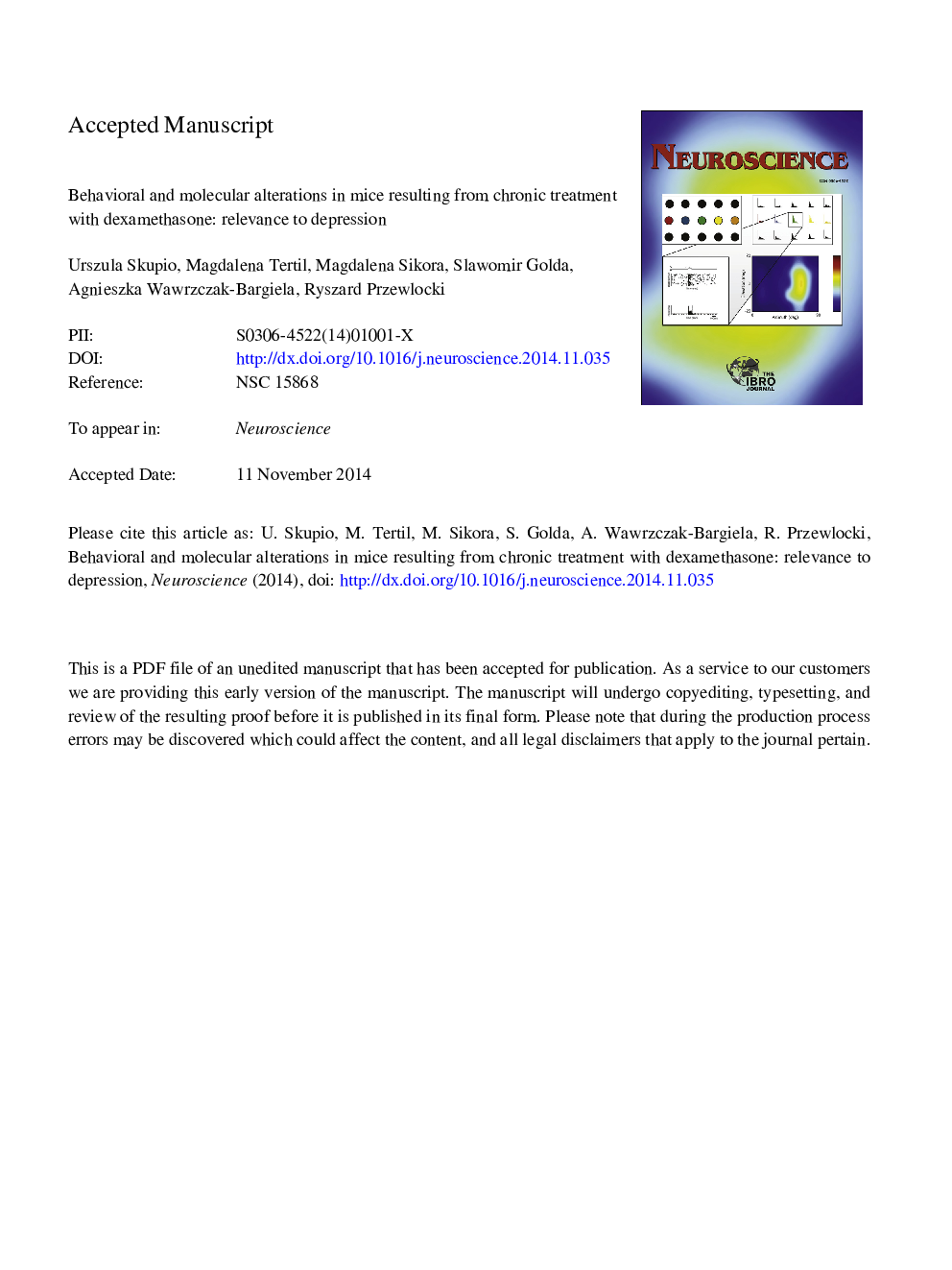| کد مقاله | کد نشریه | سال انتشار | مقاله انگلیسی | نسخه تمام متن |
|---|---|---|---|---|
| 6273081 | 1614790 | 2015 | 37 صفحه PDF | دانلود رایگان |
عنوان انگلیسی مقاله ISI
Behavioral and molecular alterations in mice resulting from chronic treatment with dexamethasone: Relevance to depression
ترجمه فارسی عنوان
تغییرات رفتاری و مولکولی در موشهای ناشی از درمان مزمن با دگزامتازون: مربوط به افسردگی
دانلود مقاله + سفارش ترجمه
دانلود مقاله ISI انگلیسی
رایگان برای ایرانیان
کلمات کلیدی
SPTEPMTGLASTFSTGFAPDEXC57BL/6J - C57BL / 6Jelevated plus maze test - آزمایش بالا به همراه پیچ و خمForced swimming test - آزمون اجباری شناStress - استرس یا فشار روانیDepression - افسردگیMajor depression - افسردگی شدیدanalysis of variance - تحلیل واریانسANOVA - تحلیل واریانس Analysis of varianceELISA - تست الیزاEnzyme-linked immunosorbent assay - تست الیزاLight/dark box - جعبه نور / تاریکیglutamate aspartate transporter - حمل و نقل آسپارتات گلوتاماتDexamethasone - دگزامتازونreverse transcription - رونویسی معکوسHPA - میلی بار یا هکتوپاسکالhypothalamus–pituitary–adrenal - هیپوتالاموس-هیپوفیز-آدرنالGlial fibrillary acidic protein - پروتئین اسیدی فیبریلاسیون گلایالCORT - کورتCorticosterone - کورتیکوسترونGlucocorticoids - گلوکوکورتیکوئیدهاMineralocorticoid receptor - گیرنده مینرالوکورتیکوئید glucocorticoid receptor - گیرنده گلوکوکورتیکوئید
موضوعات مرتبط
علوم زیستی و بیوفناوری
علم عصب شناسی
علوم اعصاب (عمومی)
چکیده انگلیسی
Chronic stress, the administration of glucocorticoids and the prolonged activation of glucocorticoid receptors (GRs) are reported to induce affective changes in humans and rodents that resemble a depressive state. However, data concerning the behavioral and molecular effects of the selective activation of specific GRs are limited, and the conclusions derived remain debatable. In this study, our goal was to investigate the behavioral and molecular changes following the prolonged activation of GRs in mice via exposure to the specific agonist dexamethasone (DEX). C57BL/6J mice were injected daily with DEX (4Â mg/kg, i.p.) or saline, and the behavior of the animals was assessed in the following paradigms: the forced swimming test (FST), the light-dark box test, the saccharin preference test and activity boxes. The mRNA expression levels of the corticosteroid receptors mineralocorticoid (MR, Nr3c2) and glucocorticoid (GR, Nr3c1), selected stress dependent genes and glial markers were analyzed in the prefrontal cortex, hippocampus and striatum. DEX-treated mice exhibited a variety of depression-like behaviors: increased time of immobility in the FST, a reduced preference for saccharin consumption and increased anxiety-like behavior. Behavioral alterations were accompanied by a decrease in the mRNA expression of GR and the increased expression of Fkbp5 and Sgk1 in the prefrontal cortex, hippocampus and striatum of DEX-treated mice. Furthermore, our results indicate a decrease in the mRNA expression of glutamate aspartate transporter (GLAST, Slc1a3), an astroglial cell marker, in the hippocampus and prefrontal cortex. These results demonstrate that the prolonged activation of GR receptors induced a depression-like state in mice, activated stress-related genes and induced a decrease in the mRNA expression of GLAST, an astroglial marker, in the prefrontal cortex and hippocampus. Together, the results reported here challenge several hypotheses concerning the role of GRs in the development of behavioral and molecular alterations relevant to stress-related disorders, such as depression, under the same experimental conditions.
ناشر
Database: Elsevier - ScienceDirect (ساینس دایرکت)
Journal: Neuroscience - Volume 286, 12 February 2015, Pages 141-150
Journal: Neuroscience - Volume 286, 12 February 2015, Pages 141-150
نویسندگان
U. Skupio, M. Tertil, M. Sikora, S. Golda, A. Wawrzczak-Bargiela, R. Przewlocki,
